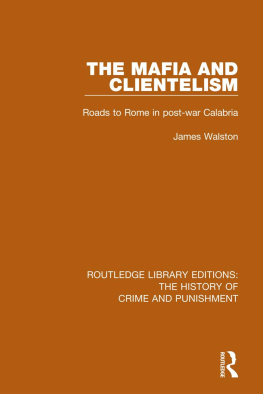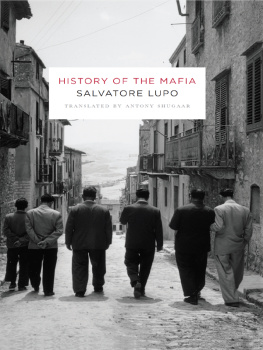
Mafia-type Organisations and Extortion in Italy
Mafia-type organisations generate several distorting effects on the economy. In Italy their presence is endemic, and not only in southern regions such as Sicily, Campania and Calabria. Such organisations endure the fierce and continuous pressure exerted by Italian anti-Mafia policy, among the most articulate and effective policies in the world. Nevertheless, they have survived by submerging, transforming and relocating their operations.
The analysis of the different Mafias of today benefits from a huge amount of empirical data produced by investigators. This allows us to outline more reliable indexes of the penetration of Mafiosi in given territories as well as to estimate the size of their activities in a transparent and empirically testable way. The contributions gathered in this book stem from the application of an innovative methodology originally introduced by the Fondazione Rocco Chinnici, and they enlarge our understanding of such a complex and dynamic phenomenon. After the presentation of the approach, the chapters are devoted to the Camorra's present situation, to an estimate of the size of extortion, to a comparison between Cosa Nostra and Camorra, to the analysis of wiretapped conversations and, finally, to the delocalisation of Mafias and the perspectives of a European anti-Mafia policy. This book was originally published as a special issue of Global Crime.
Giacomo Di Gennaro is a Professor of Sociology and Planning and Management of Social Policies, as well as Director of the Master's Degree in Criminology and Criminal Law: Criminal and Policy Analysis for Urban Security at Federico II University, Naples, Italy.
Antonio La Spina is a Professor of Sociology and Public Policy at Libera Universit Internazionale degli Studi Sociali Guido Carli, Rome, Italy, where he is Co-director of the Master's Degree in Policies against Corruption and Organized Crime. He is also a consultant of the Italian Parliamentary Antimafia Commission.
Mafia-type Organisations and Extortion in Italy
The Camorra in Campania
Edited by
Giacomo Di Gennaro and Antonio La Spina
First published 2017
by Routledge
2 Park Square, Milton Park, Abingdon, Oxon, OX14 4RN, UK
and by Routledge
711 Third Avenue, New York, NY 10017, USA
Routledge is an imprint of the Taylor & Francis Group, an informa business
2017 Taylor & Francis
All rights reserved. No part of this book may be reprinted or reproduced or utilised in any form or by any electronic, mechanical, or other means, now known or hereafter invented, including photocopying and recording, or in any information storage or retrieval system, without permission in writing from the publishers.
Trademark notice: Product or corporate names may be trademarks or registered trademarks, and are used only for identification and explanation without intent to infringe.
British Library Cataloguing in Publication Data
A catalogue record for this book is available from the British Library
ISBN 13: 978-0-415-78684-3
Typeset in TimesNewRomanPS
by diacriTech, Chennai
Publishers Note
The publisher accepts responsibility for any inconsistencies that may have arisen during the conversion of this book from journal articles to book chapters, namely the possible inclusion of journal terminology.
Disclaimer
Every effort has been made to contact copyright holders for their permission to reprint material in this book. The publishers would be grateful to hear from any copyright holder who is not here acknowledged and will undertake to rectify any errors or omissions in future editions of this book.
Contents
Giovanni Chinnici
Giacomo Di Gennaro and Antonio La Spina
Giacomo Di Gennaro
Giovanni Frazzica, Maurizio Lisciandra, Valentina Punzo and Attilio Scaglione
Attilio Scaglione
Giovanni Frazzica
Antonio Balsamo
The chapters in this book were originally published in Global Crime, volume 17, issue 1 (February 2016). When citing this material, please use the original page numbering for each article, as follows:
The costs of illegality: a research programme
Giacomo Di Gennaro and Antonio La Spina
Global Crime, volume 17, issue 1 (February 2016) pp. 120
Racketeering in Campania: how clans have adapted and how the extortion phenomenon is perceived
Giacomo Di Gennaro
Global Crime, volume 17, issue 1 (February 2016) pp. 2147
The Camorra and protection rackets: the cost to business
Giovanni Frazzica, Maurizio Lisciandra, Valentina Punzo and Attilio Scaglione
Global Crime, volume 17, issue 1 (February 2016) pp. 4859
Cosa Nostra and Camorra: illegal activities and organisational structures
Attilio Scaglione
Global Crime, volume 17, issue 1 (February 2016) pp. 6078
Proposal for a computer-assisted analysis of lawful interceptions of communication
Giovanni Frazzica
Global Crime, volume 17, issue 1 (February 2016) pp. 7998
The delocalisation of mafia organisations and the construction of a European law against organised crime
Antonio Balsamo
Global Crime, volume 17, issue 1 (February 2016) pp. 99121
For any permission-related enquiries please visit:
http://www.tandfonline.com/page/help/permissions
Antonio Balsamo is the president of the Court of Assize of Caltanissetta, competent for the trials concerning the most serious crimes committed in the central district of Sicily and the murders of judges and prosecutors working in Palermo. At present, he is dealing with the new trials for the Mafia killings of Giovanni Falcone and Paolo Borsellino.
Giacomo Di Gennaro is a Professor of Sociology and Planning and Management of Social Policies, as well as Director of the Master's Degree in Criminology and Criminal Law: Criminal and Policy Analysis for Urban Security at Federico II University, Naples, Italy.
Giovanni Frazzica is a researcher in Sociology of Culture and Communication at University of Palermo, Italy. His main research interests are the study of the representation of organised crime, the behaviour of the victims of extortion racket in different territories, the relationship between organised crime and local development, and media representation.
Antonio La Spina is a Professor of Sociology and Public Policy at LUISS, Rome, Italy, where he is Co-director of the Master's Degree in Policies against Corruption and Organized Crime. He is also a consultant of the Italian Parliamentary Antimafia Commission.
Maurizio Lisciandra is an Assistant Professor of Economics at the University of Messina in Sicily, Italy. He has earned an MPhil and a PhD in Economics from Trinity College, University of Cambridge, UK.
Valentina Punzo worked as a Research Fellow at the University of Palermo, Italy, under the European Union-funded project Gloders. Her main research interests are deviant behaviour, organised crime and simulation in social science.








